Posted on December 17th, 2019 by Mary Lord
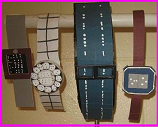 Students in grades 6 to 8 follow the engineering design process while combining mechanical engineering and bioengineering to create a new wristwatch face for a visually impaired student at their school. Teams present their designs to the class and construct prototypes of a watch face that doesn’t rely on sight to tell time.
Students in grades 6 to 8 follow the engineering design process while combining mechanical engineering and bioengineering to create a new wristwatch face for a visually impaired student at their school. Teams present their designs to the class and construct prototypes of a watch face that doesn’t rely on sight to tell time.
Read More
Filed under: Class Activities, Grades 6-8, Grades 6-8, Lesson Plans | Comments Off on Wristwatch Design for the Visually Impaired
Tags: accessibility, assistive devices, bioengineering, Class Activities, Engineering Design Process, Grades 6-8, Human-centered design, Lesson Plans, Mechanical engineering, NGSS aligned activity, teachengineering, visually impaired students, wristwatch
Posted on December 17th, 2019 by Mary Lord
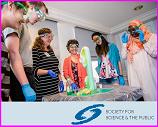 Science research competitions can spur confidence and open college doors, but many students – particularly those from underrepresented groups – don’t know about these opportunities. The Society for Science & the Public seeks to broaden participation through its Advocate Grant Program, which offers training, a $3,000 stipend, and paid trip to Washington, D.C., for individuals to help a minimum of three underserved students navigate the transition from conducting to presenting their research at a competition. Apply by March 4, 2020.
Science research competitions can spur confidence and open college doors, but many students – particularly those from underrepresented groups – don’t know about these opportunities. The Society for Science & the Public seeks to broaden participation through its Advocate Grant Program, which offers training, a $3,000 stipend, and paid trip to Washington, D.C., for individuals to help a minimum of three underserved students navigate the transition from conducting to presenting their research at a competition. Apply by March 4, 2020.
Read More
Filed under: For Teachers, K-12 Outreach Programs, Special Features, Web Resources | Comments Off on STEM Advocate Grant Program
Tags: mentor, Professional Development, Programs for Teachers, Scholarships and Fellowships, Society for Science and the Public, STEM Advocate Grant, STEM education, Teacher Training, underserved students
Posted on December 17th, 2019 by Mary Lord
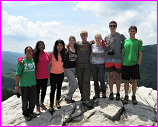 Outdoor adventures, engaging lectures, and a visit to Washington, D.C., are among the life-changing experiences that two graduating high school STEM leaders selected from each state and the District of Columbia will enjoy at this prestigious summer science-education program in West Virginia – all travel and camp fees covered. Applications are due Feb. 28, 2020.
Outdoor adventures, engaging lectures, and a visit to Washington, D.C., are among the life-changing experiences that two graduating high school STEM leaders selected from each state and the District of Columbia will enjoy at this prestigious summer science-education program in West Virginia – all travel and camp fees covered. Applications are due Feb. 28, 2020.
Read More
Filed under: K-12 Outreach Programs, Special Features | Comments Off on National Youth Science Camp 2020
Tags: Grades 9-12, Programs for Students, Scholarships and Fellowships, STEM education
Posted on December 17th, 2019 by Mary Lord
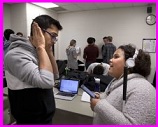 India West lost most of her sight to a benign brain tumor when she was about 4 years old. University of Michigan students in David Chesney’s Software Engineering course worked with her to develop technologies that helped her navigate school and home.
India West lost most of her sight to a benign brain tumor when she was about 4 years old. University of Michigan students in David Chesney’s Software Engineering course worked with her to develop technologies that helped her navigate school and home.
Read More
Filed under: Special Features | Comments Off on Engineering Students Design Tech for Blind Teen
Tags: accessible coding, aming for the Greater Good initiative, assistive technologies, David Chesney, software engineering, University of Michigan engineering students design technology for visually impaired teen
Posted on December 17th, 2019 by Mary Lord
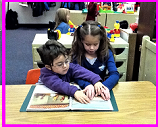 High school students practice human-centered design by imagining, designing, and prototyping a product to improve classroom accessibility for the visually impaired. The begin by wearing low-vision simulation goggles (or blindfolds) and walking with canes to navigate through a classroom in order to experience what it feels like to be visually impaired.
High school students practice human-centered design by imagining, designing, and prototyping a product to improve classroom accessibility for the visually impaired. The begin by wearing low-vision simulation goggles (or blindfolds) and walking with canes to navigate through a classroom in order to experience what it feels like to be visually impaired.
Read More
Filed under: Class Activities, Grades 9-12, Grades 9-12, Lesson Plans | Comments Off on Redesigning a Classroom for the Visually Impaired
Tags: accessibility, Class Activities, Engineering Design Process, Grades 9-12, Human-centered design, sight-impaired
Posted on December 9th, 2019 by Mary Lord
 Students in grades 6 to 11 explore the practical, scientific, ethical, and environmental issues that emerge in creating “smart” buildings that meld environmentally responsible design with cutting-edge computing technology known as the Internet of Things (IoT). Working in teams, they design and perhaps later implement smart-building solutions to make their school a better place to inhabit.
Students in grades 6 to 11 explore the practical, scientific, ethical, and environmental issues that emerge in creating “smart” buildings that meld environmentally responsible design with cutting-edge computing technology known as the Internet of Things (IoT). Working in teams, they design and perhaps later implement smart-building solutions to make their school a better place to inhabit.
Read More
Filed under: Class Activities, Grades 6-8, Grades 9-12, Lesson Plans | Comments Off on Smart School Building
Tags: careers, civil and environmental engineering, cool, electrical and computer engineering, environment, heat, IEEE, intelligent infrastructure, Internet of Things, LED, light, NGSS, sensors, smart buildings, teachengineering, TryComputing
Posted on December 6th, 2019 by Mary Lord
 To convey the major positive impact that chemical engineers and scientists have on society, the Camille and Henry Dreyfus Foundation has launched a series of short, real-life videos with proposed lesson plans for incorporating cutting edge research into the classroom.
To convey the major positive impact that chemical engineers and scientists have on society, the Camille and Henry Dreyfus Foundation has launched a series of short, real-life videos with proposed lesson plans for incorporating cutting edge research into the classroom.
Read More
Filed under: For Teachers, K-12 Outreach Programs, Special Features, Web Resources | Comments Off on VIDEOS: Chemical Sciences Careers
Tags: Camille and Henry Dreyfus Foundation, career awareness, Chemical Engineering, chemical sciences, Resources for Teachers, Videos
Posted on December 6th, 2019 by Mary Lord
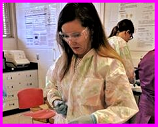 Learn how K-12 teachers across the country are transforming their STEM classes – and themselves – through NSF’s Research Experiences for Teachers in Engineering and Computer Science (RET) program. You, too, can apply to participate!
Learn how K-12 teachers across the country are transforming their STEM classes – and themselves – through NSF’s Research Experiences for Teachers in Engineering and Computer Science (RET) program. You, too, can apply to participate!
Photo: Florida elementary school STEM educator MacKenzie McNickle isolated rat tail collagen in her Read More
Filed under: Class Activities, For Teachers, Grades K-5, K-12 Outreach Programs, Special Features | Comments Off on Learn With Real Engineers This Summer
Tags: Engineering, NSF, Programs for Teachers, Research Experiences for Teachers in Engineering and Computer Science (RET), Resources for Teachers, Teacher Training
Posted on December 5th, 2019 by Mary Lord
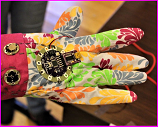 Middle and high school students follow the engineering design process to create wearable devices to monitor the health of humans, animals, or both in this competition sponsored by North Carolina State University’s Nanosystems Engineering Research Center for Advanced Self-Powered Systems of Integrated Sensors and Technologies (ASSIST). The program includes teacher training and lesson plans to help implement the design challenge. Register teams by Feb. 15, 2020.
Middle and high school students follow the engineering design process to create wearable devices to monitor the health of humans, animals, or both in this competition sponsored by North Carolina State University’s Nanosystems Engineering Research Center for Advanced Self-Powered Systems of Integrated Sensors and Technologies (ASSIST). The program includes teacher training and lesson plans to help implement the design challenge. Register teams by Feb. 15, 2020.
Read More
Filed under: Competitions and Contests, K-12 Outreach Programs, Special Features | Comments Off on Wearable Device Challenge
Tags: Competitions for Students, Contest, Nanosystems Engineering Research Center for Advanced Self-Powered Systems of Integrated Sensors and Technologies (ASSIST), North Carolina State University, One Health Initiative, wearable technology
 Students in grades 6 to 8 follow the engineering design process while combining mechanical engineering and bioengineering to create a new wristwatch face for a visually impaired student at their school. Teams present their designs to the class and construct prototypes of a watch face that doesn’t rely on sight to tell time.
Students in grades 6 to 8 follow the engineering design process while combining mechanical engineering and bioengineering to create a new wristwatch face for a visually impaired student at their school. Teams present their designs to the class and construct prototypes of a watch face that doesn’t rely on sight to tell time.








 Science research competitions can spur confidence and open college doors, but many students – particularly those from underrepresented groups – don’t know about these opportunities. The Society for Science & the Public seeks to broaden participation through its Advocate Grant Program, which offers training, a $3,000 stipend, and paid trip to Washington, D.C., for individuals to help a minimum of three underserved students navigate the transition from conducting to presenting their research at a competition. Apply by March 4, 2020.
Science research competitions can spur confidence and open college doors, but many students – particularly those from underrepresented groups – don’t know about these opportunities. The Society for Science & the Public seeks to broaden participation through its Advocate Grant Program, which offers training, a $3,000 stipend, and paid trip to Washington, D.C., for individuals to help a minimum of three underserved students navigate the transition from conducting to presenting their research at a competition. Apply by March 4, 2020.  Outdoor adventures, engaging lectures, and a visit to Washington, D.C., are among the life-changing experiences that two graduating high school STEM leaders selected from each state and the District of Columbia will enjoy at this prestigious summer science-education program in West Virginia – all travel and camp fees covered. Applications are due Feb. 28, 2020.
Outdoor adventures, engaging lectures, and a visit to Washington, D.C., are among the life-changing experiences that two graduating high school STEM leaders selected from each state and the District of Columbia will enjoy at this prestigious summer science-education program in West Virginia – all travel and camp fees covered. Applications are due Feb. 28, 2020.  India West lost most of her sight to a benign brain tumor when she was about 4 years old. University of Michigan students in David Chesney’s Software Engineering course worked with her to develop technologies that helped her navigate school and home.
India West lost most of her sight to a benign brain tumor when she was about 4 years old. University of Michigan students in David Chesney’s Software Engineering course worked with her to develop technologies that helped her navigate school and home. High school students practice human-centered design by imagining, designing, and prototyping a product to improve classroom accessibility for the visually impaired. The begin by wearing low-vision simulation goggles (or blindfolds) and walking with canes to navigate through a classroom in order to experience what it feels like to be visually impaired.
High school students practice human-centered design by imagining, designing, and prototyping a product to improve classroom accessibility for the visually impaired. The begin by wearing low-vision simulation goggles (or blindfolds) and walking with canes to navigate through a classroom in order to experience what it feels like to be visually impaired.  Students in grades 6 to 11 explore the practical, scientific, ethical, and environmental issues that emerge in creating “smart” buildings that meld environmentally responsible design with cutting-edge computing technology known as the Internet of Things (IoT). Working in teams, they design and perhaps later implement smart-building solutions to make their school a better place to inhabit.
Students in grades 6 to 11 explore the practical, scientific, ethical, and environmental issues that emerge in creating “smart” buildings that meld environmentally responsible design with cutting-edge computing technology known as the Internet of Things (IoT). Working in teams, they design and perhaps later implement smart-building solutions to make their school a better place to inhabit. To convey the major positive impact that chemical engineers and scientists have on society, the Camille and Henry Dreyfus Foundation has launched a series of short, real-life videos with proposed lesson plans for incorporating cutting edge research into the classroom.
To convey the major positive impact that chemical engineers and scientists have on society, the Camille and Henry Dreyfus Foundation has launched a series of short, real-life videos with proposed lesson plans for incorporating cutting edge research into the classroom.  Learn how K-12 teachers across the country are transforming their STEM classes – and themselves – through NSF’s Research Experiences for Teachers in Engineering and Computer Science (RET) program. You, too, can apply to participate!
Learn how K-12 teachers across the country are transforming their STEM classes – and themselves – through NSF’s Research Experiences for Teachers in Engineering and Computer Science (RET) program. You, too, can apply to participate! Middle and high school students follow the engineering design process to create wearable devices to monitor the health of humans, animals, or both in this competition sponsored by North Carolina State University’s Nanosystems Engineering Research Center for Advanced Self-Powered Systems of Integrated Sensors and Technologies (ASSIST). The program includes teacher training and lesson plans to help implement the design challenge. Register teams by Feb. 15, 2020.
Middle and high school students follow the engineering design process to create wearable devices to monitor the health of humans, animals, or both in this competition sponsored by North Carolina State University’s Nanosystems Engineering Research Center for Advanced Self-Powered Systems of Integrated Sensors and Technologies (ASSIST). The program includes teacher training and lesson plans to help implement the design challenge. Register teams by Feb. 15, 2020.